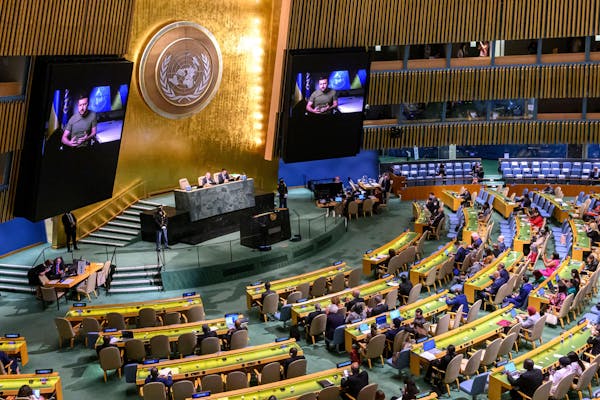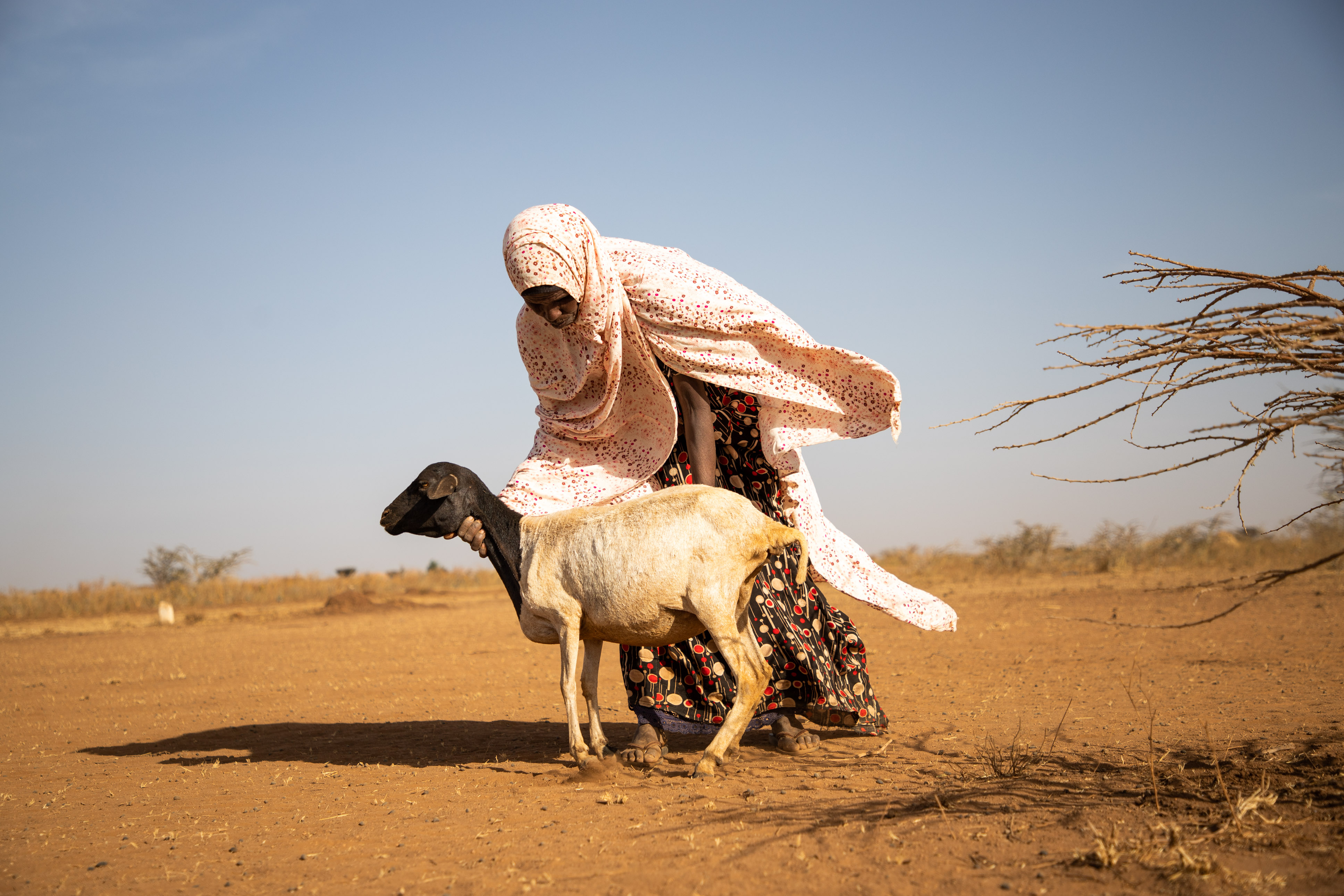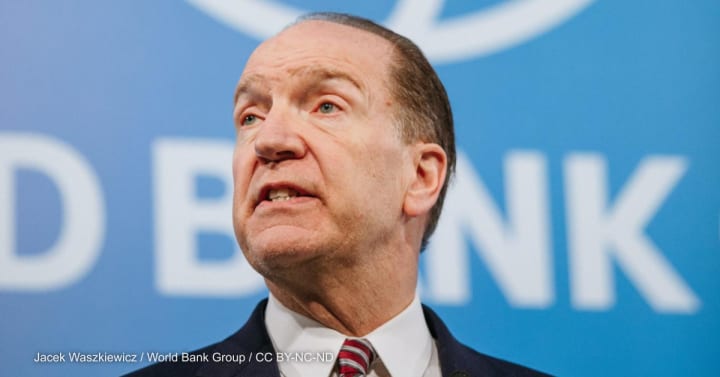Why Africa seeks a greater role on the global stage
 28/9/2022: More African leaders are calling for a permanent seat on the UN Security Council. The African Union argues that the UN Security Council, with its five permanent members — the US, Russia, China, France and the UK — does not offer the continent a voice in global affairs.
28/9/2022: More African leaders are calling for a permanent seat on the UN Security Council. The African Union argues that the UN Security Council, with its five permanent members — the US, Russia, China, France and the UK — does not offer the continent a voice in global affairs.
Source: DW
African leaders must own up to their failures
 24/9/2022: In speeches at the 77th session of UN's General Assembly, Africa’s post-Independence leaders have raised a legitimate issue when they demand reparations from colonial masters. But their case is undermined by their own record of repression and chronic economic mismanagement.
24/9/2022: In speeches at the 77th session of UN's General Assembly, Africa’s post-Independence leaders have raised a legitimate issue when they demand reparations from colonial masters. But their case is undermined by their own record of repression and chronic economic mismanagement.
Source: The East African
Calls by Zelensky and Biden for UN reform win support
 22/9/2022: The Ukrainian president demands that Russia should be stripped of its veto in the UN security council. Academic research suggests there is widespread public support for maintaining the authority of the UN and making its structures more representative of the world population.
22/9/2022: The Ukrainian president demands that Russia should be stripped of its veto in the UN security council. Academic research suggests there is widespread public support for maintaining the authority of the UN and making its structures more representative of the world population.
Source: The Conversation
Global food crisis tightens grip on 19 hunger hotspots
 21/9/2022: The number of people facing acute food insecurity worldwide is expected to continue to rise precipitously, driven by rising conflict, weather extremes, and economic instability. Afghanistan, Ethiopia, Nigeria, South Sudan, Somalia and Yemen alone account for almost a million people facing catastrophic levels of hunger.
21/9/2022: The number of people facing acute food insecurity worldwide is expected to continue to rise precipitously, driven by rising conflict, weather extremes, and economic instability. Afghanistan, Ethiopia, Nigeria, South Sudan, Somalia and Yemen alone account for almost a million people facing catastrophic levels of hunger.
Source: UN Food and Agriculture Organization
World Bank sees global development in crisis
 20/9/2022: World Bank President David Malpass has expressed concern about the reversal of progress in human development. Education and debt are particularly challenging for low income countries as climate change combined with the war in Ukraine continue to undermine the world economy.
20/9/2022: World Bank President David Malpass has expressed concern about the reversal of progress in human development. Education and debt are particularly challenging for low income countries as climate change combined with the war in Ukraine continue to undermine the world economy.
Source: Devex
Myanmar human rights spiralling from bad to worse
 21/9/2022: The independent human rights expert on Myanmar has appealed to UN Member States to change course in their collective response to the military coup. The death toll of innocent people is rising significantly and 130,000 Rohingya remain in de facto internment camps.
21/9/2022: The independent human rights expert on Myanmar has appealed to UN Member States to change course in their collective response to the military coup. The death toll of innocent people is rising significantly and 130,000 Rohingya remain in de facto internment camps.
Source: UN News
Venezuela accused of crimes against humanity to crush dissent
 20/9/2022: The UN says President Maduro of Venezuela is directing security agencies to arrest and torture political opponents. Abuses are also rife in the south, where gold mining profits have put a target on the backs of indigenous peoples.
20/9/2022: The UN says President Maduro of Venezuela is directing security agencies to arrest and torture political opponents. Abuses are also rife in the south, where gold mining profits have put a target on the backs of indigenous peoples.
Source: DW
UN report warns of crimes against humanity in Ethiopia
 20/9/2022: The UN Commission of Human Rights Experts on Ethiopia has found evidence of widespread violations in the northern Tigray conflict. Its report reveals reasonable grounds to believe that both government and Tigrayan forces have committed war crimes.
20/9/2022: The UN Commission of Human Rights Experts on Ethiopia has found evidence of widespread violations in the northern Tigray conflict. Its report reveals reasonable grounds to believe that both government and Tigrayan forces have committed war crimes.
Source: The East African
It’s time for the US to ban cluster munitions
19/9/2022: Evidence suggests that both sides in the Ukraine war have deployed cluster bombs. Global pressure to ban the production of these weapons would increase if the US would join the UN Convention on Cluster Munitions.
Source: Human Rights Watch
UN chief links windfall profits to climate loss and damage
 21/9/2022: UN secretary general António Guterres has called on developed economies to tax the windfall profits of oil and gas companies, in part to support poorer countries suffering loss and damage caused by the climate crisis. Wealthy nations have remained conspicuously silent on how to finance extreme climate impacts.
21/9/2022: UN secretary general António Guterres has called on developed economies to tax the windfall profits of oil and gas companies, in part to support poorer countries suffering loss and damage caused by the climate crisis. Wealthy nations have remained conspicuously silent on how to finance extreme climate impacts.
Source: Climate Home News